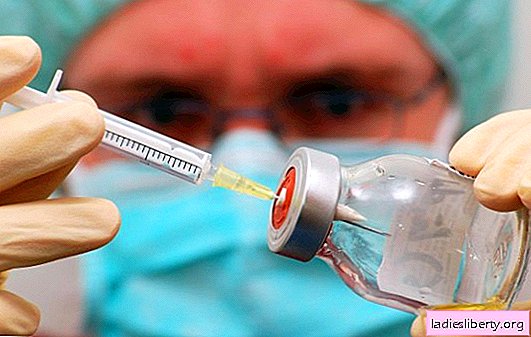
Exceptionally, vaccination is by far the most effective preventive measure against influenza. But it is not as simple as a tea party with raspberries, an event, and therefore, before deciding on a flu shot, you should familiarize yourself with useful information about it.
What is the basis of the benefits of the flu shot and what exactly is it
If the influenza viruses were in a stable state, the disease would have long been defeated, but the disease would have been aroused, like many other pathogenic microorganisms, have a powerful ability to mutate, as a result of which, every few months, new strains of the virus come into the view of scientists and doctors, only partially retaining the traits of their predecessors.
Some of them are capable of causing a real epidemiological catastrophe (vivid examples are the Hong Kong and bird flu), others are characterized by amazing weakness.
Typical symptoms of this viral infection are extremely unpleasant:
• aches and pains in muscles and joints;
• increased body temperature (38 and above is a common thing);
• drowsiness, accompanied by sleep disturbances;
• loss of appetite;
• cough;
• general feeling of physical weakness and weakness;
• headache;
• runny nose.
Always and everywhere, flu is considered as one of the most dangerous diseases of the modern world, characterized not so much by a severe course, but by destructive complications for the human body, the most common ones, of which include:
• otitis media (an inflammatory process in the ears);
• digestive tract dysfunction;
• damage to the tissues of the respiratory system (especially the lungs and bronchi);
• visual impairment;
• inflammation of the sinuses (sinusitis);
• disturbances in the work of the heart;
• decreased kidney function.
Sometimes it’s possible to cure the complications (although the flu is distinguished every year by an unpleasantly amazing resistance to the latest generation of antibiotics), but the virus is also able to transfer the complications that have arisen into the category of chronic pathologies, as well as bring the sad development of events to disability and even death.
Influenza epidemics spread with the speed of a forest fire, especially in cities, everything happens by airborne droplets, that is, you can get infected by talking and even breathing in some air in an insufficiently ventilated room, through personal items (from toys to a mug, of which, let's say , one person finished compote after another).
It is possible to resist the disease with the help of vaccination, the principle of which is based on the natural biological reactions of the human body and the whole scheme can be represented approximately as follows:
• the preparation for vaccination contains weakened or dead pathogens of the disease that are not capable, in fact, of any harm to the human body;
• but the human immune system invariably reacts to their appearance, starting to actively develop antibodies to protect against the virus;
• and in this way the formed protection pattern can be used by her against a real threat, that is, an attack of live influenza viruses.
Today, influenza vaccination is not only one of the most recommended, but also one of the most affordable - in many cases it is relied on to citizens free of charge and also, if desired, it can be carried out for a fee, in a private clinic.
In most cases, the vaccine enters the body through injection, some forms of the drug can be administered through the nasal mucosa.
Despite the fact that the vaccine does not guarantee protection against the onset of the disease, it is a guarantee of its relatively mild, without a lot of complications, course and accelerated healing process.
In addition, unlike vaccination from a number of other diseases, after it is not required to observe a special regime, that is, in fact, the usual way of life does not undergo any changes.
Who is not recommended to neglect the benefits of flu shots
Although vaccination is voluntary, doctors do not tire of repeating that the number of citizens who decide to it not only to protect their health, but also for the safety of others with whom they are in regular contact, can directly affect the speed of spread of the influenza epidemic, and the chances mutate the flu into something even more invulnerable to antibiotic treatment and dangerous.
And every year the list of groups of people to whom vaccination against influenza is recommended in the first place remains unchanged, these include:
• children (especially schoolchildren and toddlers attending kindergarten);
• persons diagnosed with chronic bronchopulmonary and cardiovascular diseases;
• students;
• elderly people;
• teachers and other staff of childcare facilities;
• people weakened by surgery during the past year, serious injuries;
• pregnant women;
• employees of medical institutions;
• persons who, by the nature of their professional activities, are involved in contacts with a large number of people - attendants of rest houses, waiters, librarians, sellers, trainers in gyms, teachers at universities and so on.
What affects the benefits of a flu shot
Taking a vitamin-mineral complex, a healthy diet and playing sports - all this, of course, is very useful, but, as scientists assure, it does not affect the development of immunity from influenza after the appropriate vaccination procedure.
The only thing that is recommended unconditionally can be expressed in just two tips regarding several days prior to vaccination:
• Do not visit crowded places, to reduce the risk of catching some kind of "seasonal" disease (ARI, flu);
• not consume new foods that can, theoretically, cause allergies.
A flu shot should be given about 3-4 weeks before the expected epidemic. Thus, a person will have time to form immunity, which will remain at a consistently high level throughout the course of the disease.
And it is also worth noting that the effectiveness of the flu vaccine itself is affected, of course, by the vaccine used.
It should be relevant, that is, designed to combat those forms of pathogens that are expected to be invaded in a particular season in a particular place (city, region ...).
But there is always the risk that, having protected from one strain, it, not omnipotent, will naturally miss the attack of the influenza virus, the spread of which was least expected.
Unfortunately, modern technology does not yet allow the creation of vaccines against everything, the maximum that they cover is 2-5 strains of the virus.
What is the harm of flu shots
Discussions about how really harmful the flu shots really have been have been engaging scientists and ordinary people since the discovery of the first vaccines, and so far each of the warring parties has enough evidence to maintain its position.
Indeed, despite the work of virologists and other specialists in the conditions of modern and excellent technologies in the field of science and medicine, vaccines are constantly required to be improved, eliminating the risks that accompany their use.
And the most common symptoms that accompany flu vaccination are the following:
• headaches;
• redness and swelling near the injection site;
• nausea, loss of appetite;
• increase in body temperature;
• aches, pain in muscles and joints.
The minimum manifestation of such reactions is not considered dangerous and disappears within 24-48 hours from the time of vaccination, but if they are delayed, as well as if breathing difficulties and cardiac abnormalities are observed, it is urgent to consult a doctor (but, in principle, consult with any deterioration of health after vaccination will not be superfluous). People who have individually reacted poorly to the vaccine need to carefully select in the future a replacement for the used drug or abandon it altogether.
But according to statistics, even when vaccinating small children, the elderly and pregnant women (that is, the most sensitive groups of people), the percentage when the administration of the drug led to serious consequences (like damage to the central nervous system) is negligible.
Most scholars agree that the scale with advantage, protecting the body from the effects of the flu, outweighs the bowl with a theoretical minimum probability of risk.
And the vaccine itself is not always to blame for the bad, there are many reasons for the negative development of events:
• incompetence or negligence of a medical worker who did not take into account the state of human health in which vaccination should not be done;
• the use of a vaccine that has expired or was stored in inappropriate conditions;
• incorrect calculation of the individual dose of the drug.
Contraindications to the vaccination procedure, in which the harm of influenza vaccination is difficult to even predict, include:
• allergy to chicken protein (and only a small number of vaccines are created without his participation);
• malignant neoplasms in the body;
• severe blood diseases;
• children under 6 months of age;
• taking drugs that suppress the immune system;
• exacerbation of chronic diseases;
• inflammatory processes in the body;
• Current “winter” ailments - colds, acute respiratory infections, flu - 2 weeks should elapse between the relative recovery from this and the vaccine.
To identify contraindications, the doctor should talk with the patient, conduct an examination and, if necessary, prescribe the appropriate necessary tests.
And of course, not all flu vaccines on the market are equally good, and before you go for the vaccine, it is very advisable to study the information about the drug that will be used. Moreover, it is worth focusing not only on the data of the manufacturer, but also on independent third-party assessment, research materials.
As for the cases when a person becomes ill with the flu a few days after the vaccination, this is simply explained - since the drug itself cannot be the cause (as already mentioned, the viruses in it are either dead or weak), this manifests itself in the desired incubation stage an infection picked up much earlier by the vaccination procedure.
And she is not capable of protecting the vaccine because she simply has not yet developed immunity. Or "lucky" to encounter a strain of the virus that was not in the vaccine.











